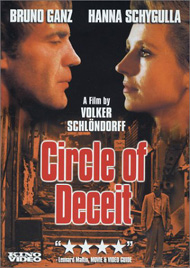| Release List | Reviews | Price Search | Shop | Newsletter | Forum | DVD Giveaways | Blu-Ray/ HD DVD | Advertise |
| Reviews & Columns |
|
Reviews DVD TV on DVD Blu-ray International DVDs Theatrical Reviews by Studio Video Games Features Collector Series DVDs Easter Egg Database Interviews DVD Talk TV DVD Talk Radio Feature Articles Columns Anime Talk DVD Savant HD Talk Horror DVDs Silent DVD
|
DVD Talk Forum |
|
|
| Resources |
|
DVD Price Search Customer Service #'s RCE Info Links |
|
Columns
|
 |
Circle of Deceit
|
||||
Volker Schlöndorff's harrowing tale of civil war in Beirut is as perfect a film as has been made about an international hot-spot. Filmed in the city even as fighting raged on all sides, it's a fascinating piece of modern truth that should be seen by anyone with an open mind about how such wars - Beirut, Kosovo, perhaps soon Bagdad - operate. The photography and acting is sensational and there's no partisan point of view beyond showing the horrible facts. Kino's excellent disc presents Circle of Deceit beautifully and allows the director to air his thoughts in two excellent video featurettes - one new, and one made 25 years ago in the real rubble of Beirut.
Bruno Ganz's honest reporter Georg has several changes of heart while in Beirut, but the one we feel the most is when a "friendly" sniper offers to shoot an innocent victim, to give his cameraman a scoop photo. Georg refuses but a man is killed anyway; the "observer" can no longer pretend he's insulated from the barbarism he covers. Georg later finds himself bidding for a black marketeer's (Jean Carmet) atrocity photos, exactly the kind of violence-porn that the people at home want to see. One of Georg's compatriots is biased toward the Christian side of the conflict even though the atrocities are equally divided. Nobody threatens Georg personally but his presence motivates his "subjects" to show how savage they can be. Thinking he's finished with his wife Greta back in Hamburg (Gila von Weitershausen), Georg takes up with old flame Arianna, who invites him to do what she has done, forget Germany and "become an Arab." They drive around the risky city looking for a baby to adopt. No orphan is left unclaimed by the factions, as all want to raise them as fighters. Some contemptuous nuns finally give her a baby that might be brain-damaged. She starts to raise it on her own. The ending has the only concession to expectations, when Georg returns to Hamburg and behaves like a standard liberal idealist in "issue movies." Disgusted by his editors' enthusiasm to exploit Beirut's agony, he quits, as a good rebel should. What we remember most from Circle of Deceit are the truly amazing scenes shot right in the no-man's land of shattered downtown Beirut. Volker Schlöndorff used real fighters (with real ammo in their guns) and amid the total chaos his effects men had the luxury of blowing up anything they wanted without having to worry about permits. The dozens of unpleasant corpses are concoctions from Italian artists, thank God, but almost everything else we see in this "fictional" story happens in the actual battlegrounds, sometimes during fighting, with potential combatants. The film is not shot verité style but with cameras on tracks and cranes to give Schlöndorff's desired "operatic" look to the drama. The verisimilitude is astonishing. Right outside the hotel is the beginning of no-man's land. A ruined Holiday Inn with artillery craters in its sides has smoke and fire belching from random windows. For those concerned, the film is probably a hard R, with a steamy sex scene up front and very convincing shots of burned and shredded corpses. It's a serious and extremely well-made film from the maker of The Lost Honor of Katherina Blum, Death of a Salesman and Criterion's upcoming The Tin Drum. Kino's DVD of Circle of Deceit is a fine encoding of this great, almost miraculous German film - miraculous in that nobody was killed during its making. The enhanced image looks fine on a large monitor. Volker Schlöndorff appears in two featurettes. In the one shot during the filming he explains the extreme conditions of production. How'd they get insurance? How could anyone convince Bruno Ganz to stand still with extras pointing loaded guns at him and the possibility of a real sniper picking him off? The second featurette shows the director 25 years later repeating some of the same information (Schygulla loved Lebanon and, like her character searched for a child to adopt) and voicing his own conclusions about civil wars: Without a strong central government, the population breaks down into fiefdoms controlled by warlords along political or religious lines, with no law except the tyranny of the strong. To enforce the division and hatred necessary to keep the struggle going (and insure funds from other countries) atrocities are committed. The outside money is used to pay the fighters, who have no future except as guerilla soldiers. And it just keeps going, in the case of Beirut for eleven years. Schlöndorff sees the same pattern of civil war and endless carnage happening in Kosovo and now possibly in Iraq. Also included is a generous selection of production stills.
On a scale of Excellent, Good, Fair, and Poor,
Circle of Deceit rates:
Review Staff | About DVD Talk | Newsletter Subscribe | Join DVD Talk Forum |
|
| Release List | Reviews | Price Search | Shop | SUBSCRIBE | Forum | DVD Giveaways | Blu-Ray/ HD DVD | Advertise |






